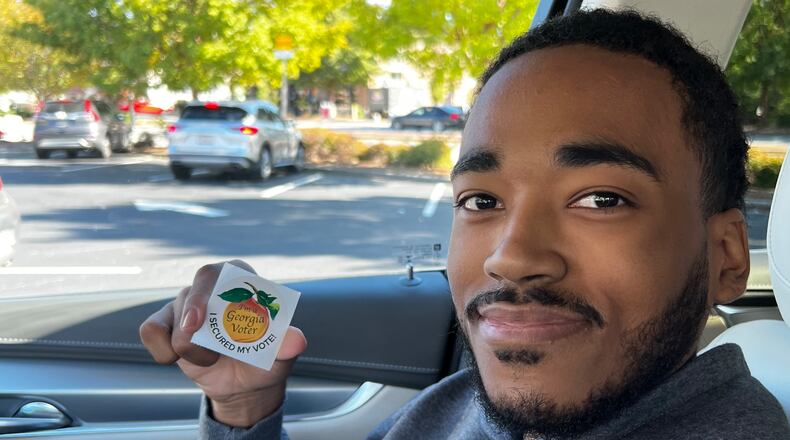Dean Burden, 20, was excited to vote in his first presidential election. On Saturday, Oct. 19, he and his mom drove a few minutes from their home in Cobb County to the polling place where Burden had previously voted in the December 2022 runoff between Herschel Walker and Raphael Warnock.
It was the same polling place where his dad and older brother had voted just a week earlier.
His mom finished voting in a few minutes. Burden never got past check-in.
When he showed his driver’s license, the poll worker said the address on his license didn’t match his address in the system.
“You aren’t supposed to be voting in Cobb,” the poll worker said to him. “You have to go vote in Fulton.”
Burden’s address in the computer system was listed as the family’s previous address, where they hadn’t lived since 2021 before Burden was even eligible to vote, said his mother.
In early October, Burden’s mom had verified voter registration information for the entire family and everything was correct but in the intervening weeks, her son’s address had been changed. Burden said he never changed his address.
“I was more confused than anything because this had never happened to me before. I voted in Cobb multiple times, my address hasn’t changed, what is different now?” said Burden, a junior at Georgia State University.
Poll workers didn’t give him an answer and I suspect he won’t get one.
This is the new era of voting in Georgia (and across the country), in which fomenting suspicion has taken precedence over ensuring that eligible voters have a smooth voting experience. It is a moment when last-minute lawsuits destined for defeat are most likely intended to serve as fodder for future claims of fraud rather than actual attempts to secure voter rights.
It is a moment when panic buttons and bulletproof glass are becoming a fixture of election offices because history has already shown that for some of my fellow Americans violence and intimidation win over reason in the face of defeat.
Since July, when a state law governing voting challenges took effect, more than 63,000 Georgians have had their voter status challenged, according to The Associated Press. That’s a big jump from the 18,000 voters that were challenged before the law was passed. Most of the challenges are related to address changes.
Burden and his mom left the first polling place and drove to Northside Library in Fulton County as directed by the poll worker. Confident he would be able to vote, Burden attempted to check in but was thwarted once again.
“At that moment, I felt like I was getting the runaround and I was getting frustrated but I wanted to keep my cool,” Burden said. “I wasn’t trying to cause any problems, I was just trying to get my vote off.”
This time, the poll worker sent them back to Cobb County to a voting location in Powder Springs, a 40-minute drive. Once there, Burden got the same story again: the address in the system didn’t match the address on his driver’s license so he couldn’t vote.
But this time he also got a poll supervisor who took the time to help him figure out what to do.
He needed to call Cobb County elections before they closed, she told him. Then she sat with him and gave him the correct phone numbers to call. Sometimes she took the phone herself to explain the situations to election officials. She helped Burden change his address, print a copy of the new registration, then sent him to yet another polling place in Cobb County.
“I can confidently say, If I hadn’t run into that woman, I wouldn’t have been able to vote that day,” Burden said.
That’s probably correct considering a similar situation happened to another 20-year-old student from the University of Georgia, according to reporting from WSB. The student who has a Milton address and is registered in Fulton County went to vote only to learn that the residential address on his voter registration had been changed in February to an address in Rome. So he drove to Rome to cast his vote but was told he couldn’t vote due to the discrepancy. After three hours, the student gave up and left without voting.
Burden’s story has a more promising ending. When he arrived at the fourth polling place of the day, it was after 5 p.m. He gave a printout to the designated poll worker who verified the updates and then sent him to vote.
“I am satisfied that I was able to get my vote off and that I ran into a person who wanted me to get my vote off just as much as I wanted to get my vote off,” Burden said. But of course, he has questions. “There are still answers that I haven’t gotten. Who changed my address? How did it happen? I knew it wasn’t me and I knew it wasn’t my parents.”
Not everyone has the conviction, the time, or the resources to do what Burden and his mother did that day. But at the same time, this is what we must do for ourselves and sometimes for others. We should seek ways to help people vote, not look for reasons to prevent them from voting.
“When I got up that morning, I knew I wanted to vote and needed to vote. I was excited to vote in my first presidential election,” Burden said. “I don’t think anybody should run into this issue. No one should be given the runaround just for wanting to cast their vote.”
Read more on the Real Life blog (www.ajc.com/opinion/real-life-blog/) and find Nedra on Facebook (www.facebook.com/AJCRealLifeColumn) and X (@nrhoneajc) or email her at nedra.rhone@ajc.com.
About the Author





